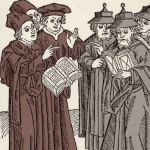The Passing of Alfred Dreyfus: A Pivotal Moment in Jewish History
July 12, 1935, marked a significant day in Jewish history: the passing of Lieutenant-colonel Alfred Dreyfus, a figure who stood at the intersection of French society’s intricate dynamics and its relationship with the Jewish community.
The Dreyfus Trial: The Conundrum of the Century
Throughout its long, intricate history, France has often been a paradox for its Jewish population. With each monarch’s reign came waves of acceptance followed by expulsion, resulting in centuries of upheaval. The advent of the French Revolution in 1791, fought for “liberty, equality, fraternity,” offered hope for change, albeit a hope that was not always realized for the Jewish people.
While the revolution granted French citizenship to Jews, it failed to guarantee them full integration into the wider French society. It was under Napoleon Bonaparte’s reign that the Jewish community began to see more significant integration. However, this progression was not without its limitations. Among such instances, the birth of Alfred Dreyfus in 1859, in the largely Jewish region of Alsace, was a landmark event.
Alfred Dreyfus: A Rising Star Amidst a Turbulent Era
In the aftermath of Napoleon’s defeat at Waterloo and the ensuing transition between different forms of government, France found itself in a constant state of flux. By the time of the Third Republic, France was grappling with significant loss to the rising Prussian (modern-day Germany) war machine, leading to an exodus of Jews from the Alsace region to mainland France. Amidst these shifting circumstances, Alfred Dreyfus, a young artillery officer, was rising through the ranks.
Unfolding of the Dreyfus Affair
Despite the increasing presence of antisemitism within the French army, the rise of Jewish officers like Dreyfus suggested a potentially equal environment. However, when a plot to sell French artillery secrets to the Germans was uncovered, Dreyfus was quickly accused, and an intense trial ensued.
The trial quickly became a spectacle, with Dreyfus’s Alsatian birth and Jewish identity feeding into the pre-existing prejudices of the French Republic. Despite insufficient evidence, the court-martial board found Dreyfus guilty, triggering a sequence of events that reverberated across France and beyond.
Dreyfus’s Exile and Rehabilitation
Exiled to Devil’s Island off the coast of French Guiana in South America, Dreyfus spent five years in solitude. Meanwhile, back in France, mounting evidence pointed to the true culprit: Major Ferdinand Walsin Esterhazy. Despite this, the military was reluctant to admit its mistake, leading to a contentious period of factionalism within the nation.
Following another court-martial and the intervention of a newly elected liberal government, Dreyfus was pardoned on the condition he admit his wrongdoing. Dreyfus, eager to reunite with his family, accepted the pardon, and years later, the courts finally acquitted him of any wrongdoing, restoring his military service.
Dreyfus’s Unwavering Dedication and Legacy
Despite enduring humiliation, Dreyfus’s dedication to France never wavered. He returned to the battlefield during the Great War, fighting in the longest battle of the war, the Battle of Verdun. Dreyfus passed away on July 12, 1935, leaving behind a legacy that fundamentally shaped Jewish history. His trial notably influenced Theodor Herzl, a Viennese journalist covering the event, who came to believe that Europe could never truly be home for Jews, no matter how much they assimilated.
References:
Relevant sources for further reading include articles from Encyclopedia Britannica, napoleon.org, Jewish Virtual Library, The New Yorker, and Harvard University’s Religious Literacy Project. For a comprehensive understanding of the Dreyfus Affair, consider reading materials available on Jstor and Time. For more context about Jews in France, resources from HISTORY and My Jewish Learning may be helpful.













Start the discussion at community.jewishoriginal.com